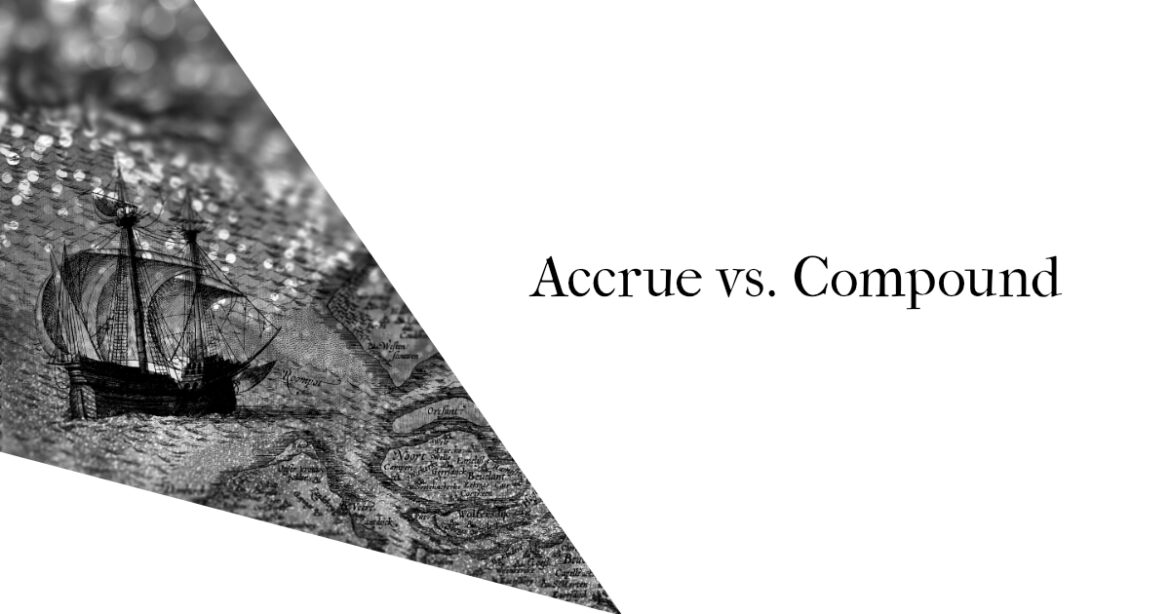Accrue or Compound

I was interacting with a senior dental student on Facebook a few days ago and it became apparent that some students may not understand the difference between the capitalization of outstanding interest and compounding interest upon graduation.
This particular student is going to graduate with approximately $400,000 in federal graduate student loans (all of which are unsubsidized). The student is concerned that upon graduation, the accrued interest (approximately $50,000) will be capitalized and then interest will begin compounding. This is not the case.
For the senior dental student who has found herself responsible for a $400,000 student loan with $50,000 in accrued interest what happens upon graduation?
After graduation the interest that has accrued while in school will be capitalized (added to the $400,000 principal). The new principal balance at graduation will be $450,000. From there, interest will begin to accrue on this new principal. However, if you are enrolled in an income based repayment plan, the interest that accrues on this new principal will not be capitalized unless you leave the program – even then, the amount of interest that can be capitalized is often capped by the program (10% of the initial loan balance in PAYE for example).
If the borrower’s student loans are federal loans and the borrower is enrolled in an income based repayment plan where the monthly payment does not cover the monthly accrued interest, the outstanding interest is not added to the principal balance each month (the outstanding interest is not capitalized). This means that the interest will not compound.
[Just so we’re clear, monthly interest – monthly payment = outstanding interest]Compounding interest is the financial principal many people use to build significant wealth over a long period of time (saving for retirement). If interest were to compound in this student’s scenario, the unpaid interest would be added to the principal balance at the end of each month; thus increasing the principal balance and the amount of interest that accumulates would increase each month.
The compounding of interest on a student loan of this size would potentially spiral out of control quickly for a general dentist enrolled in a loan repayment program where the monthly payments may not cover the interest that accrues each month. Fortunately, for this young dentist and thousands more, these programs do not capitalize the outstanding interest unless the borrower no longer qualifies for the partial-financial hardship as defined by the loan repayment program. Hint – when you owe $400,000, you do not need to worry about not qualifying for income based repayment. If your annual earnings ever even approached the threshold where you no longer qualify for a partial-financial hardship, you would have easily paid off all of your student loans as your earnings ramped up.
What should a young dentist with a $450,000 student loan do?
After graduation you should enroll into an income based repayment plan to cap payments to a percentage of your income and get your feet on the ground. In the beginning your payments will not even cover the interest – to be honest I can see a scenario where your payments would never cover the interest during the first decade of your career as a general dentist.
With that said, with this debt load, you should probably enroll in REPAYE to take advantage of the 50% interest subsidy as opposed to PAYE (a plan with a lower payment and the ability to file taxes separately to protect a high earning spouse’s income, and five fewer years of repayment before qualifying for taxable forgiveness, but no interest subsidy). If you can find your way to own a practice that has a very strong cashflow, consider refinancing – but I personally would not refinance 400k into a private loan as an associate (non-owner) general dentist.
When students start talking about student loans north of four-hundred thousand dollars, my opinion is that you really need to either specialize or go for Public Service Loan Forgiveness (PSLF).
There are a lot of people who will say buy a practice as soon as possible, and I somewhat agree, but the hard part about that is that the type of practice a young dentist needs to buy to service this type of debt will be a high production/collections office. These offices are often hard to find and are often expensive to purchase unless you’re really willing to commit to a small town.
[Student loans of this size will have a significant impact on your personal finances and likely career development. You need to learn more about your student loans and how they pertain to your own unique situation than I can provide in a blog post. Remember, this is just an article you found on the Internet and you should not put your entire financial future at risk by heeding my advice without consulting a qualified professional – you can learn a little bit about me here, and you should know that I’m a dentist managing my own student loans. I am not an attorney, CPA, or CFP]
